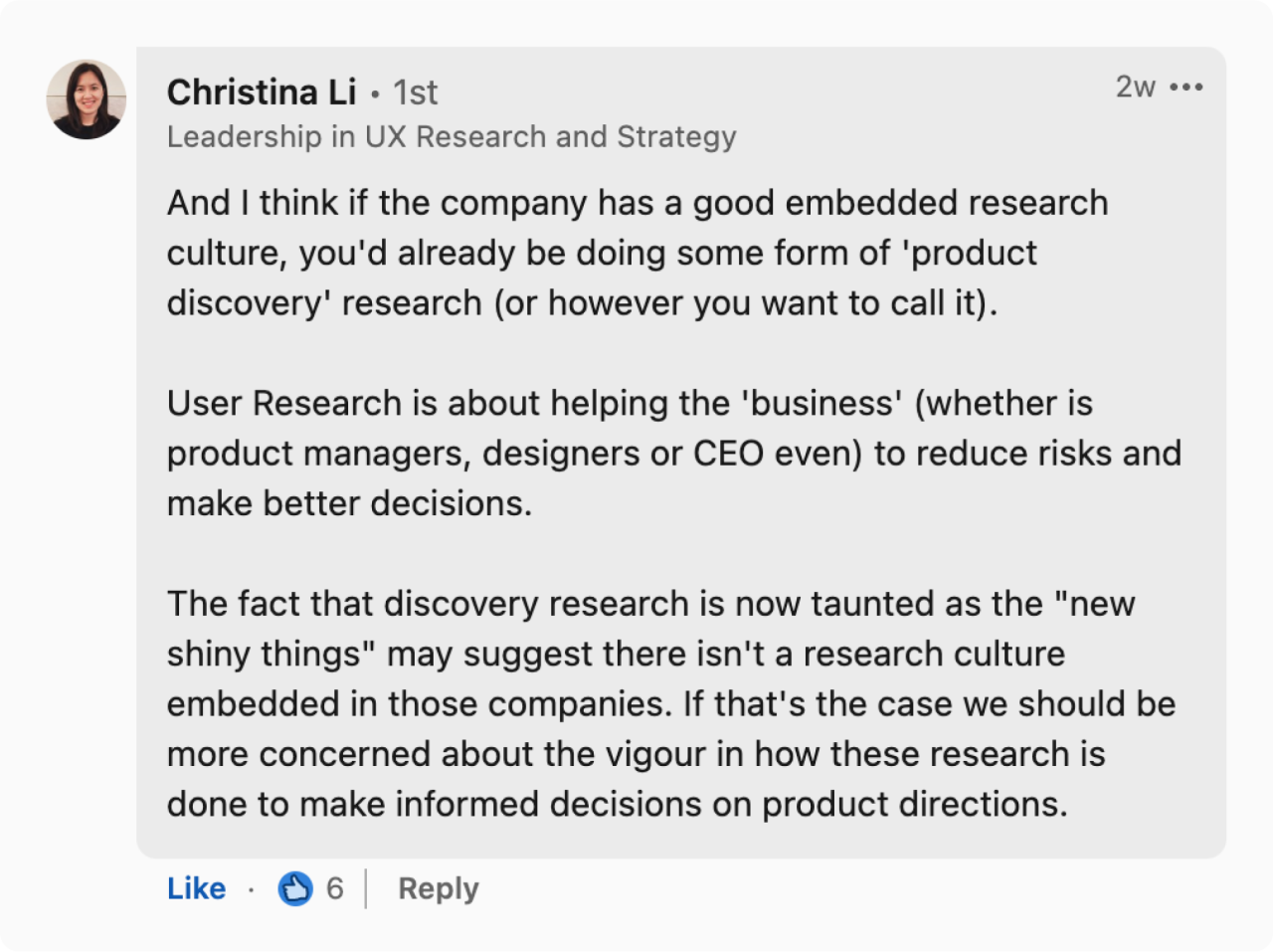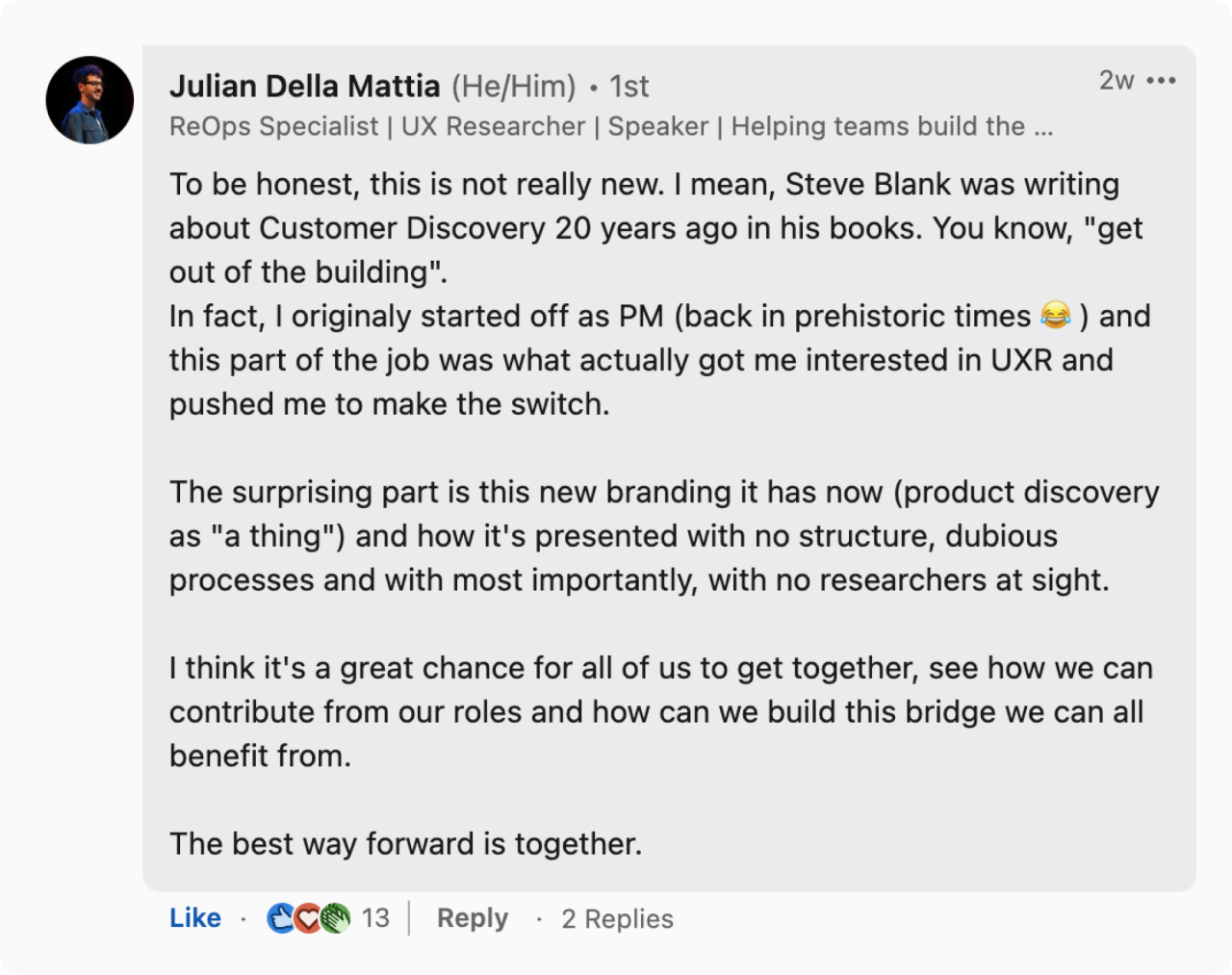Research by any other name: How should UXRs feel about discovery?

Getting across this.
Published
26 September 2023
Content
Creative
What’s the difference between discovery and research and how should UXRs think about their product counterparts?
I recently wrote on LinkedIn:
“Hey, researchers! Product has discovered research and is calling it product discovery. What are you doing to ensure that you encourage their enthusiasm, embrace their practices, and become familiar with their approach?
Hey, product managers! Product discovery isn’t new. Researchers have been doing this forever. What are you doing to connect to the researchers at your company/in your network before you reinvent the wheel?”

Admittedly, I was being tongue-in-cheek. But I see these posts all the time: Product people starting from scratch with discovery practices when there’s already a whole field out there dedicated to this craft, and researchers acting surprised, shocked, and even offended that other people are practicing their craft by another name.
I get the feeling these two groups aren’t communicating much about how they view their roles, particularly the role research plays in their responsibilities.
Coming from a research background, my followers fall more into the research camp. As such, their voices are represented here. But if you’re a product person interested in joining the conversation, there should be plenty of perspectives to chew on below.
So, how did people respond to the post?
Identifying a (non)-existent research culture
Christina Li’s response mirrored a common theme among researchers. “The fact that discovery research is now taunted [sic] as the ‘new shiny thing’ may suggest there isn’t a research culture embedded in those companies,” she wrote.

Companies with no or few researchers haven’t established the necessary culture. Because that culture isn’t present, the practice of discovery is, in fact, new to product managers.
Product or continuous discovery could be taking off in organizations without researchers. But given the response to my post, it seems it’s also happening in companies with a researcher or a research team. What’s a researcher to do?
Hannah Knowles has an idea: “I think this is an opportunity for UX Researchers to redefine their position. I hear of many researchers who want to work on ‘meatier’ overarching problems…”

It’s a popular argument: If product does continuous discovery, researchers can focus on more generative research projects that take longer to plan and execute but produce broader, more strategic insights.
This is indeed an opportunity. But others had something else in mind—what if we focus on the potential joys of collaboration with product peers? If we want to embrace collaboration, we will have to let go of ownership. Let’s look at some examples of what commenters had to say from this perspective.
Collaboration, not ownership
Product people conduct “discovery,” and researchers do “research.” These activities differ in definition and rigor, but they all stem from the same activity: reaching out to users and customers.
Julian Della Mattia reminded us that this practice researchers call research and product managers call discovery is not new. Neither group owns the concept. “I mean, Steve Blank was writing about Customer Discovery 20 years ago in his books. You know, ‘get out of the building,’” he wrote.

Let’s keep this in mind: We did not come up with the concept of using user and customer insights to build successful companies. And neither did product. Julian makes the broader point: “I think it’s a great chance for all of us to get together, see how we can contribute from our roles, and build this bridge we can all benefit from.”
Behzod Sirjani agreed: “... I’d love for us to move beyond territory and semantic battles to figure out how we can all learn and make better decisions together...”

Ownership is a tricky road to go down. Who owns access to customers? Do you think everyone in your organization would have the same answer? More importantly, is that the challenge worth focusing on?
Ruben Stegbauer highlighted the importance of collaboration versus ownership: “No single profession or employee group should have a monopoly on conducting research with users.” Imagine this perspective for a moment. What if we started from the premise of collaboration and forgot about ownership? How could things change?

How can we move forward?
We all want a solution, right? I asked some of the commenters above to throw in their two cents on the following question: What would be your number one suggestion for researchers looking to successfully collaborate with product within their organization?
Ruben already provided a great suggestion in his comment: “Experimentation is fine, too. But make it 100% clear it’s time-bound and reversible. Start small, maybe with one team, and then evaluate...”
Behzod told me, “I think the best thing researchers can do to collaborate with product as it relates to continuous discovery/research is help product realize that research should inform decision-making, not just ‘learning’ and work with product to align on what’s the right operating model in terms of what research should drive, versus where they collaborate, versus what is more self-serve for product.”
Let’s answer this question in the specific case where a company already has a researcher on board. Julian’s advice: “The first thing would be to understand where is this push for ‘product discovery’ coming from exactly, what’s the plan, and what’s the reasoning behind going this way.”
And is research involved in this process? Are they part of the discussion? Julian’s advice: “...address this head-on and discuss how researchers can help drive a continuous process, why it’s important that they are involved in it, and talk about the quality of the output and the standards that need to be met.”
It’s going to take flexibility and some give-and-take from both sides. Research and product? We both want the same things, and it’s beneficial to both groups to work together to get there.
Subscribe to Outlier
Juicy, inspiring content for product-obsessed people. Brought to you by Dovetail.